Kevin Clarke
Operetta Research Center
25 May, 2023
Teresa Hrdlicka has just published a 184-page book entitled Das kaiserliche Sommertheater in Bad Ischl: Operette und Oper unter Kaiser Franz Joseph I. It chronicles the theatrical history in the spa town from the 1860s up until the death of Emperor Franz Joseph in the midst of World War 1. The richly illustrated little book covers a lot of operetta history. So we interviewed Teresa Hrdlicka about her publication and the operetta side of her story. Here are her answers.

The Emperor leaving his coach in front of the theatre. (Photo from Teresa Hrdlicka’s “Das kaiserliche Sommertheater in Bad Ischl” / LIT Verlag)
You’ve written a book on the Imperial Summer Theater in Bad Ischl and the operettas that were performed there. Why is this history relevant, and why should it interest readers today, more than 100 years after the glory days of the venue are over?
I think the interest in former times, like the era of Emperor Franz Joseph, is very up-to-date. Just look at the many new movies about “Sissi” and the respective publications.
Bad Ischl was – no doubt – the most fashionable spa of its time. I would claim that the Bad Ischl summer festival at the fin de siècle, with its huge variety of genres (operetta, comedy, farce, drama, opera, cabaret, ballet), was a predecessor of the later Salzburg Festival.
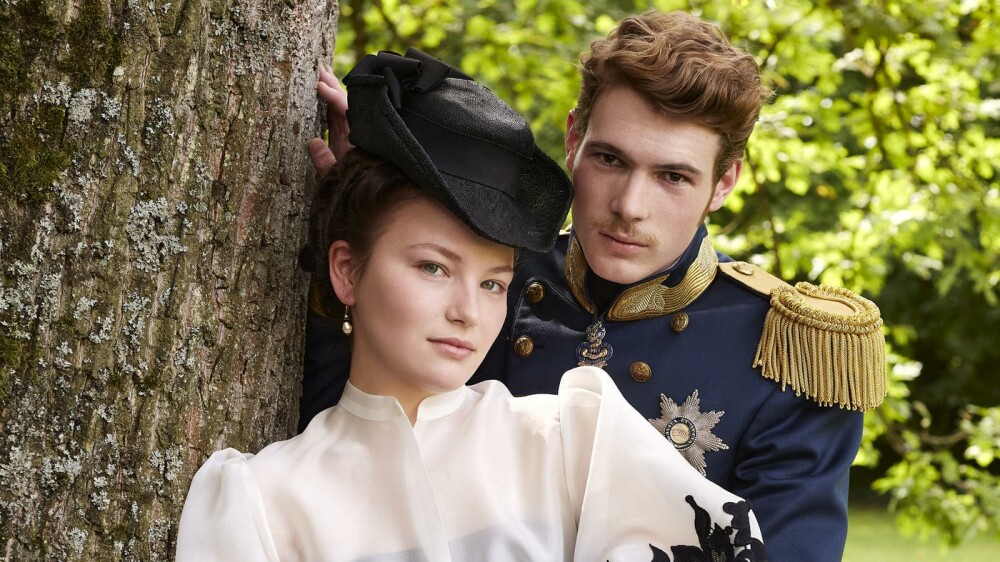
Devrim Lingnau (l.) and Philip Froissant as Elisabeth and Franz Joseph in “Die Kaiserin”. (Photo: Netflix)
In 2024 Bad Ischl will be European Kulturhauptstadt. Interests will focus not only on Ischl and the Salzkammergut, but on the cultural past of the region. In my opinion the general attention is focused too much on the person of Franz Lehár. Until now nobody has been aware of how much music history there was in the city before Lehár.
By the way, Johann Strauss jun. was also often in Ischl and owned a villa like Lehár, he played an important role in the cultural life of the city, but this has been totally forgotten. I wanted to give these forgotten artists a voice again!
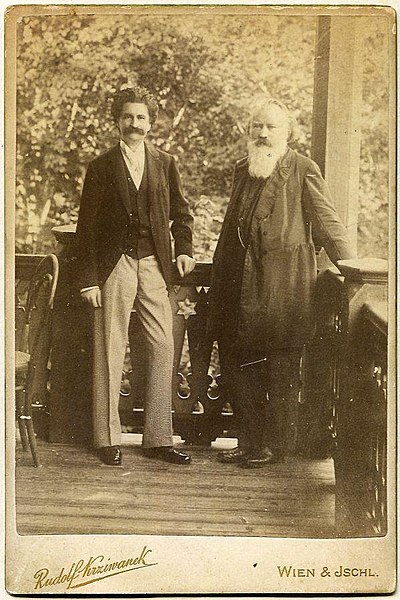
Johann Strauss (l.) and Johannes Brahms on the balcony of Strauss’ villa in Bad Ischl, 1894. (Photo: Rudolf Krziwanek)
How did you discover the topic of your book? Are you from Ischl?
I am from Vienna. According to the “Kurliste” my ancestors are traceable as visitors back until the year 1855. My mother’s family used to spend holidays in Ischl for six generations. I grew up with the local operetta history and that’s why I chose the topic. I was even a substitute in the festival orchestra (violoncello) at the times of Prof. Macku. I studied musicology and specialized in (Italian) opera.
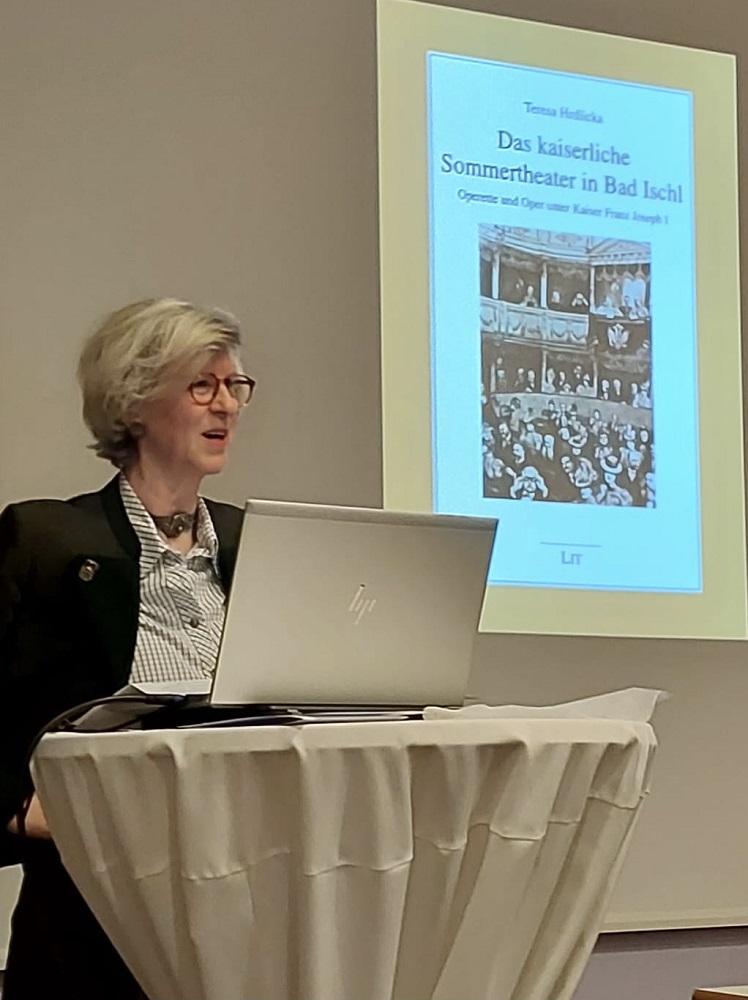
Teresa Hrdlicka presenting her book. (Photo: Private)
Today, especially in Austria, the genre operetta is seen mostly as “old fashioned” and completely out of touch with the younger generation. What was the place operetta inhabited in the history of Ischl society back then? What was the most surprising discovery for you, personally?
I think that operetta is having a comeback. It is cultivated at several big houses and especially at summer festivals like Bad Ischl, Baden bei Wien, Mörbisch. The theatre of Bad Ischl and especially the operetta evenings were the social meeting place of society back then.
My most surprising discoveries: that the festival offered daily performances for 12 weeks every summer (mid-June to mid-September) and that the repertory included up to 26 different (!) operettas per season. Plus, that the theatres of Ischl and Salzburg were united under one management for 55 years.
Could today’s operetta companies learn something from the way operetta was performed and presented in Ischl’s summer theater?
Extempores are often mentioned, and references to current incidents in couplets. The performers had more skills (like singing, acting, dancing), especially in the so called “Golden Era” of the 19th century.
I wonder how they managed to change sets daily. Presumably a lot of improvisation was required back then.
How difficult was it to find source material for your topic?
Unfortunately, no documents whatsoever have survived, with the exception of about 100 play bills in the Theatermuseum Vienna. My main source were the reviews in the Ischler Wochenblatt, which appeared from 1873 until 1915. Those reviews are very detailed!
You structure your book by names of the various directors of the theater, starting with Mr. Kotzky. Who were these directors? Did the Emperor appoint them? Was it a prestigious position?
The theatre was owned by the city and leased by the municipality to the various directors. The directors were either actors or singers and/or stage directors. And they often managed another theatre during the winter season, like Salzburg, Linz, or the Josefstädter Theater in Vienna.
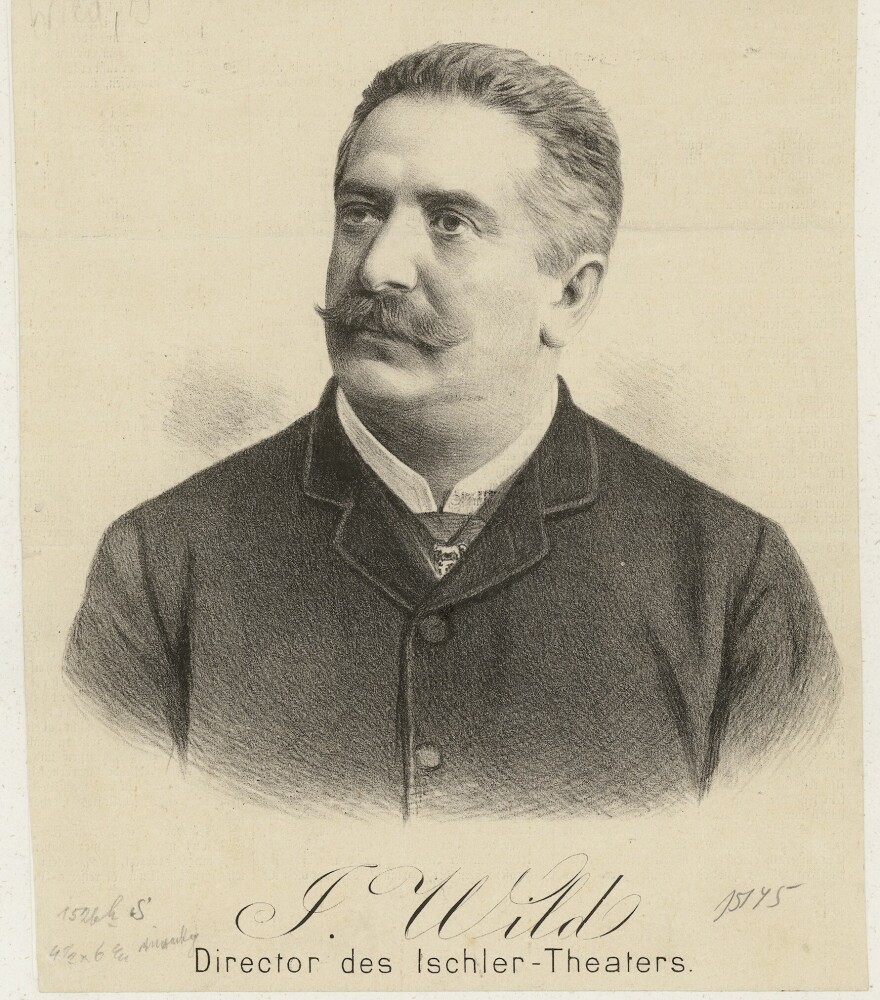
Long-term director Ignaz Wild (1885-1903). (Photo from Teresa Hrdlicka’s “Das kaiserliche Sommertheater in Bad Ischl” / LIT Verlag)
What about ticket prices? Was operetta in Ischl a high-class entertainment? Was there a dress code (as there was at the Bouffes Parisienne)?
There was no dress code. At the so-called Théȃtre paré evenings – especially festive performances for visiting heads of state like King Edward or Emperor Wilhelm – the access was limited to the court, aristocracy, and the military. Everyday performances were accessible for everybody. The prizes were half of those at the Court Theatres, for example a box cost 8 Gulden, a medium seat 1 Gulden and 20 x.
In your chronical of productions, there is some French operetta – but no Offenbach. Was he seen as too scandalous?
There were lots of Offenbach operettas especially in the 1860s and 70s: in the 1873 season no less than eight different Offenbach operettas. The chronicle in my book refers to first representations only – that’s why Offenbach is missing (there are too little sources about the time before 1873).

Johann Strauss “out-weighing” Jacques Offenbach: a Viennese newspaper caricature from the 1870s.
In Vienna, there was a brothel right behind the Theater an der Wien. Audience members could go there with actresses after the performance. Was there something comparable in Ischl?
I doubt it. Ischl was too small for such an establishment. It is only conveyed that the favored coffee shop of the artists was the nearby Café Ramsauer, which still exists!
Did the great operetta stars from Vienna come to Ischl to perform their famous roles?
Indeed! The stars liked to do summer seasons in Ischl, some owned villas there or by one of the lakes nearby. Besides, it was obvious that one could easily combine an engagement with recreation.
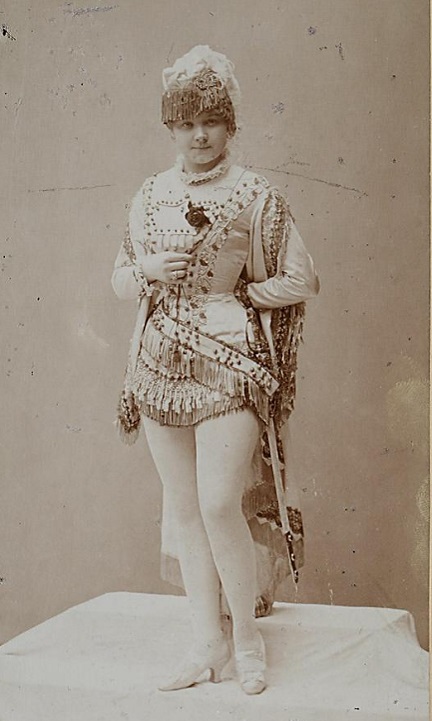
Ilka Palmay. (Photo: Rudolf Krziwanek / Theatermuseum Wien)
Alexander Girardi often had guest appearances, for example as Zsupan (Zigeunerbaron) and Andredl (Das verwunschene Schloss), Louis Treumann performed Danilo (Lustige Witwe), Mizzi Günther Saffi (Zigeunerbaron), Adele and Rosalinde (Fledermaus) or Zanetta (Die Prinzessin von Trapezunt), Ilka Palmay Boccaccio, Barinkay (!), and Mamzell Nitouche. Most surprising: the internationally acclaimed opera diva Lilli Lehmann performed the role of Violetta (La traviata) twice in 1907!

The theater in Bad Ischl today. (Photo from Teresa Hrdlicka’s “Das kaiserliche Sommertheater in Bad Ischl” / LIT Verlag)
Were the Emperor and Empress fans of these operetta productions? Did ticket prices go up if they were in the auditorium?(Did the Emperor/Empress comment on operetta performances in diaries or letters?
The Empress Elizabeth apparently never visited the theatre. The Emperor, however, seems to have appreciated the small provincial theatre and its informality a lot, in comparison with the big Court Theatres in Vienna. During his stays at Bad Ischl – mostly for eight weeks – he visited the theatre up to nine times per season, preferably escorted by his daughter Marie Valerie. Ticket prices went up only in case of outstanding guest appearances. As to mentions in letters, I found two by Franz Joseph: that he slept well and long in the Court box!
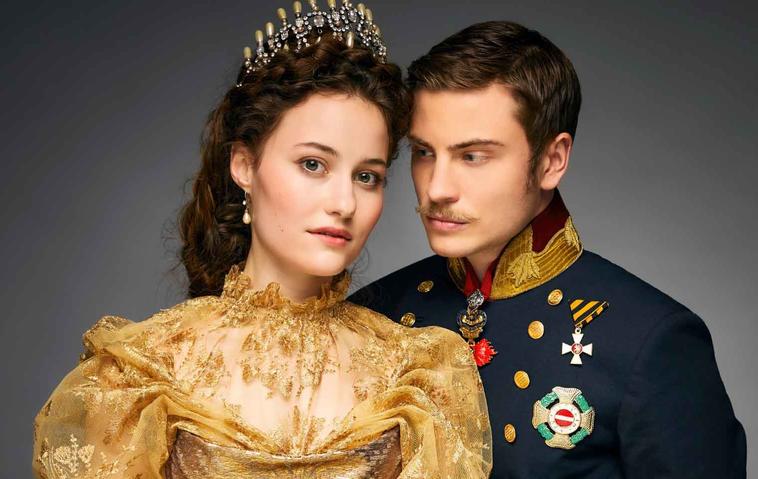
Dominique Devenport (l.) and Jannik Schümann as Elisabeth and Franz Joseph in “Sisi”. (Photo: RTL+)
Today, Ischl and the Salzkammergut are internationally known holiday spots. Will you translate your book into English?
Good idea, I would appreciate an English edition! Please speak to my editor!
Could one turn the story of the Imperial Summer Theater into a tv series like Fosse/Verdon?
I easily could imagine a documentary on the topic – that would be desirable – but not a movie. I am not familiar with Fosse/Verdon but I couldn’t imagine a movie. I feel there is not enough action or thrill in the story. But I believe an exhibition would be great – with all the play bills, photos, scores, set designs. costumes etc.
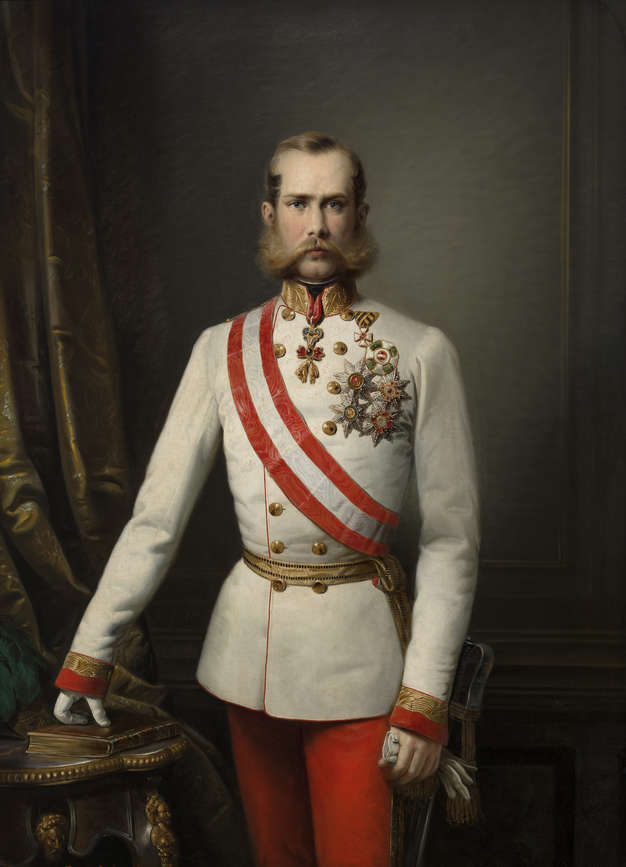
Posrtrait of Emperor FRanz Joseph I. (Photo: Franz Russ)
For more details about the book, click here.

This book makes me want to go to Bad Ischl – really interesting – I hope it will be translated into English? It will be well worth if, I am sure.
Dear Sir or Madam,
Greetings and thank you for the interesting interview.
Does Frau Hrdlicka or anyone has the Ischl theatre program from 1888 and later, please? I have a copy of the letter of Herzog Elimar von Oldenburg (1844-1895,also a playwright), who wanted that his play Schloss Varad to be shown in the theatre of Ischl before the Kaiser in 1888 or so. Was his play really shown there?
Thank you.
Kind refards,
Janina